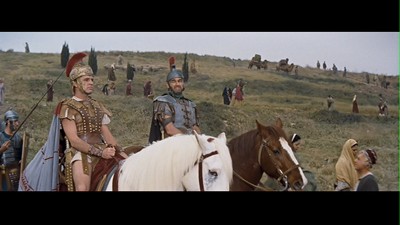This review was originally written for DVDTalk.com in 2009.
But...were you...out there?!
No, it's not a Dennis Hopper line from Apocalypse Now or a hippy come-on from one of his buddy Peter Fonda's biker gang movies. It's the strange religious tic bestowed upon the morally conflicted Roman tribune Marcellus Gallio, effected with the appropriate amount of disbelief by Richard Burton, apparently counting his money in the pauses. It's meant to ask the sinners that surround him if they were there when he drove the nails into Jesus' hands, or whether they are amongst the untouched and unaware.
Luckily for Christianity, this sales pitch has long since fallen by the wayside since it was entered into the brochure back in 1953, when The Robe sucked in gobs of money and lost five Academy Awards. Unless Jesus' message of everlasting peace is meant to refer to the extended nap this non-historical anti-epic will make you long for, because The Robe is more suitable for selling a comfy pillow than a religion. At one point midway through the first act, a rather bewildered Pontius Pilate (Richard Boone), searching for an answer as to who gave him this icky script, declares that he needs to wash his hands. It's a rather obvious Biblical allusion, one the nearby servant has probably heard too many times before. He slouches against the wall, arms folded, barely able to muster the energy to tell Pilate, "You've already washed them." If that actor had put that clip on his audition reel, he'd have been sure to get a part as an extra in The Wild One [review] playing Juvenile Delinquent #5 standing by the jukebox and finding nothing worth rebelling against.
I mean, seriously, if the actors in the movie are this disinterested in it, what hope do we have?
For those looking for the summary, here it goes: Marcellus Gallio, a rival of Caligula (Jay Robinson), pisses off his more powerful enemy to such a degree that he is banished to Jerusalem to learn his lesson. He takes along his muscular and tanned Greek slave Demetrius (an appallingly bad Victor Mature), who immediately upon stepping foot in the Holy Land meets the Messiah's gaze and is instantly converted. (Jesus, too embarrassed by this production, never allows his face to be seen.) Sucks to be the slave, then, whose master is the dude wielding the hammer up on Calvary. Heartbroken, Demetrius absconds with the dead Christ's frock, which burns the flesh of Marcellus when he tries to wear it. Demetrius flees, and Marcellus, feared to be mad, is sent on a quest to find the cursed garment and destroy it. He finds religion instead, leading the crusade back to Rome and reclaiming his betrothed (Jean Simmons, who was much luckier when Hamlet sent her down the river).
Now, before you fire up your hate mail, don't get this twisted: I have no problem with the religious content of the movie, as hamfisted as it is. I've done my time in Sunday School, and sure, if there is a maximum on eye rolling that gets one condemned, they are preparing a place in Hell for me right now. Even so, if a story is told well, I don't care what religion or philosophy it peddles. Dazzle me with your skills, kid, and I'll listen to whatever you're hawking. Such is not the case with The Robe.

Directed by Henry Koster (Flower Drum Song) from a script by Philip Dunne (The Agony & the Ecstasy) and Albert Maltz (The Naked City [review]), adapted from a novel by Lloyd C. Douglas (Magnificent Obsession [review]), The Robe is a drag from start to finish. The cast seems uninterested because the script isn't interesting. If the medium is the message, the writers decided to stop at the message and let the rest sort itself out. There is no tension, no passion, all of the converts walk around like blissed-out zombies, and there is no sense of their savior's majesty. Apparently this party was BYOB: Bring Your Own Belief, because no one is going to bother to explain theirs. Just trust that what they are doing is important, m'kay?
Where there is a sense of majesty in The Robe, and what makes it still enough of a curiosity to recommend a viewing by cinephiles, is its use of the massively wide frame of Cinemascope. The first picture released using the 2.55:1 aspect ratio, The Robe gave Henry Koster a cinematic canvas never before available. As Martin Scorsese says in his introduction to the picture included on some home videos releases, you have to imagine the curtain opening ever wider while you're sitting at the theatre, exposing new dimensions to the screen than you had seen previously. Koster packs his frame with detail, be it a two-shot close-up or a wide panoramic shot of ancient Rome or the crucifixion up on a distant mountain. Sure, his camera pretty much never moves, so it's all static shots from start to finish, but still, you have to appreciate just how much movie there is to gaze upon frame by frame.
Just remember that for every moment where your breath is taken away, there are at least five more opportunities to steal it back.




1 comment:
"CriterionConfessions: Your cinematic confession booth! Dive deep into the world of film with insightful reviews, thought-provoking analyses, and passionate discussions. From classic masterpieces to contemporary gems, explore cinema's rich tapestry through diverse perspectives. Join us in celebrating the art of storytelling, one confession at a time."
traffic lawyer prince george va
Post a Comment